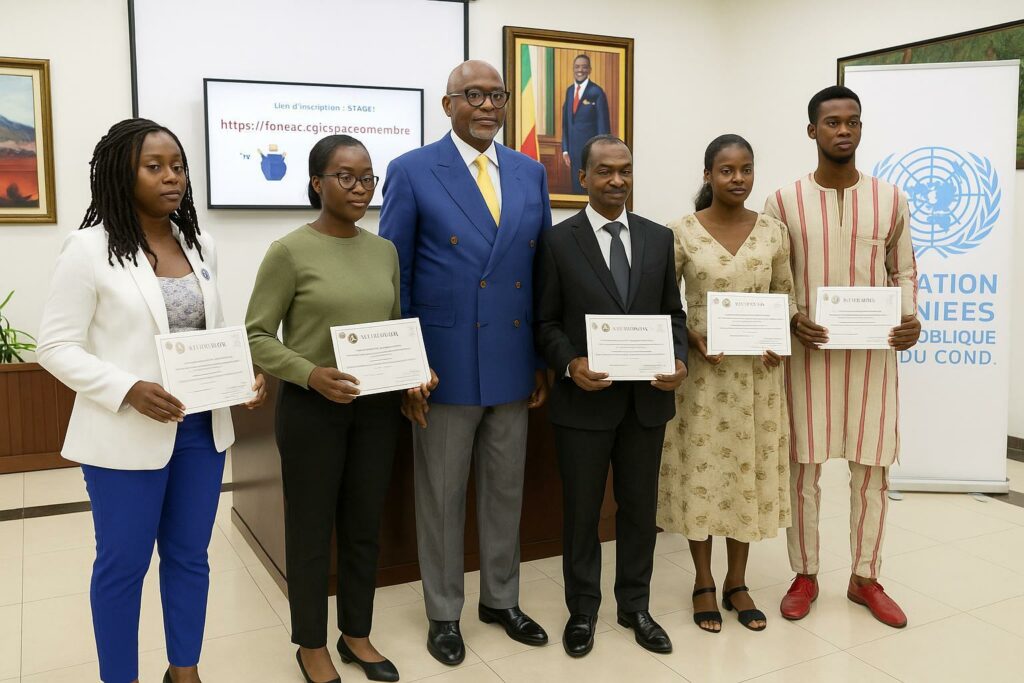Youth employability at the heart of Vision 2025
In Brazzaville’s humid August air, the handing over of five symbolic certificates to members of STAGI’s maiden cohort appeared at first glance as a modest photo opportunity. Yet the scene, hosted by Minister Hugues Ngouelondelé and flanked by senior United Nations officials, condensed a wider national ambition: repositioning the Republic of Congo’s demographic dividend at the centre of its Vision 2025 development framework. With nearly 60 percent of the population under thirty (World Bank, 2022), the government has repeatedly argued that macro-economic resilience and social cohesion rest on transforming idle potential into productive labour. The STAGI programme—Support for Internships and Youth Integration—functions as a spearhead within this doctrine, pairing state resources with private-sector absorption capacity.
From classroom to rig: the Fonea–Eni partnership
The operational engine of STAGI is the National Fund for Employability and Apprenticeship, Fonea, established in 2021 to channel petroleum revenues toward human-capital formation. On 22 August, Fonea’s director-general Robert Patrick Ntsibat and Eni Congo’s managing director Andrea Barberi signed a letter of engagement that will place thirty graduates inside the Italian major’s upstream operations. Barberi underscored what he termed a “strategic symbiosis” between youth ambitions and labour-market pragmatism, insisting that “investing in human capital is investing in Congo’s future.” The oil sector, responsible for close to 80 percent of export earnings (IMF, 2023), remains the country’s technological frontier. By embedding trainees on rigs and in geoscience labs, the partnership seeks to cultivate transversal skills—digital surveying, HSE compliance, project logistics—that remain scarce across the wider economy.
UNDP’s catalytic role in skills ecosystems
Beyond the corporate spotlight, the United Nations Development Programme has acted as an ecosystem architect, aligning donor support with national policy. UNDP resident representative Adama Dian Barry reiterated during the ceremony that “youth autonomy is a peace dividend as much as it is a growth driver.” Financially, UNDP co-funds the YouthConnekt Congo initiative, whose steering committee was inaugurated on the same day. Programmatically, it supplies entrepreneurship curricula under the “Start and Improve Your Business” methodology, through which 500 STAGI participants are currently designing business plans. According to internal project dashboards consulted by this magazine, 467 young Congolese have already completed a structured mentorship sequence, while 615 received personalised coaching in soft-skills and labour-law literacy. These figures, though preliminary, signal a pivot from ad-hoc scholarship schemes toward an integrated employability chain.
Scaling up: lessons from cohort one inform cohort two
Cohort one comprised 115 interns spread across public utilities, agribusinesses and the nascent ICT sector. Early monitoring suggests that more than half secured either contract extensions or definitive employment offers within six months—a placement rate surpassing regional comparators such as Cameroon’s PIJ project, which oscillates around 35 percent (AfDB, 2022). Minister Ngouelondelé attributes this performance to rigorous matching algorithms operated by Fonea’s digital platform, which compiles company profiles and candidate psychometrics in real time. Applications for the second cohort, opened during the ceremony, will be processed exclusively online, a first for a Congolese public-sector programme of this scale. Officials expect at least 3 000 applicants within the first four weeks, reflecting both the credibility gained and the pent-up demand for structured pathways into formal employment.
Regional implications for Central African labour markets
Congo-Brazzaville’s experiment carries implications beyond its borders. CEMAC economies share a common dilemma: how to translate commodity wealth into inclusive growth. By leveraging the balance sheets of an oil major, the convening heft of the United Nations and the regulatory facilitation of the state, STAGI proposes a replicable blueprint. Analysts at the Economic Commission for Africa note that combining wage subsidies with industry-grade apprenticeships reduces time-to-hire while raising productivity metrics, thereby creating fiscal space for further social investments. Crucially, the programme’s political optics remain favourable; rather than relying on populist cash transfers, it signals a long-term commitment to skills. That posture reinforces international confidence at a juncture when Brazzaville negotiates climate finance and infrastructure packages in multilateral fora.

